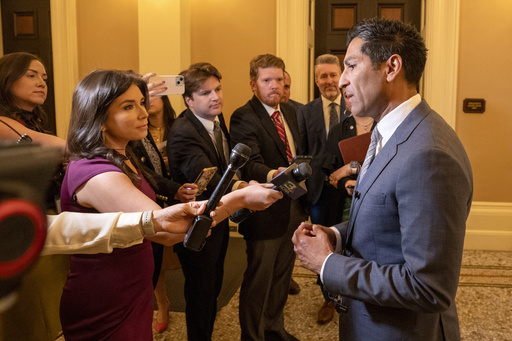SACRAMENTO, Calif. (AP) — California lawmakers don’t know for sure how big their budget deficit is, but on Thursday they decided it’s big enough to go ahead and reduce spending by about $17 billion.
The vote represents a preemptive strike from Democratic Gov. Gavin Newsom, who is trying to get ahead of a stubborn shortfall that has been increasing every month and will likely extend into next year and beyond — when the second-term governor could be eyeing a campaign for the White House.
The true size of the deficit has been difficult to pin down. In January, Newsom insisted it was about $38 billion. But the nonpartisan Legislative Analyst’s Office said it was actually $58 billion because Newsom didn’t include some reductions in public education spending. Then in February — after state revenues continued to come in below expectations — the LAO revised its estimate to as much as $73 billion.
State budgets across the country have tightened as economic growth has slowed and states have exhausted the billions of dollars in aid from the federal government during the coronavirus pandemic. The problem is more pronounced in California, where the budget is easily the largest in the country — and in fact the state’s economy is bigger than most countries.
The deficit could be a liability to Newsom, particularly as he steps into his role as a top surrogate of President Joe Biden’s reelection campaign. Newsom and his allies in the state Legislature have been doing everything possible to reduce the deficit. For instance in December, the governor ordered state agencies to immediately cut costs. And last month, Newsom signed a law raising a tax on companies that manage California’s Medicaid program, raising another $1.5 billion.
Newsom won’t announce an updated deficit number until next month, after Californians have filed their tax returns and state officials have a better idea of how much money they have. Thursday’s vote in the state Legislature means Newsom can announce a number that will be much smaller than it would have been. The $17 billion in reductions lawmakers approved Thursday, combined with the anticipated withdrawal of about $13 billion from the state’s various savings accounts, means Newsom can already count on reducing about $30 billion of the shortfall.
“The reality is that even with the deal, the state still faces a deficit of tens of billions of dollars,” said Chris Hoene, executive director of the California Budget and Policy Center. “They’ve left a lot of hard stuff on the table to be resolved over the next two months.”
There were no headline-grabbing cuts in the reductions lawmakers approved on Thursday. Despite California’s recent budget woes, the Democrats in charge have refused to raise income taxes or impose steep cuts to the most expensive programs, including health care and public education.
Instead, most of the savings comes from either cancelling or delaying spending that was approved in previous years but hasn’t yet been spent. It also relies on a number of accounting tricks to make the shortfall appear smaller, including shifting paychecks for state workers by one day from June 30 to July 1 so the state can count $1.6 billion in salaries for the next fiscal year.
Republicans have long assailed this strategy, arguing that Democrats are just pushing spending into the future in the hopes the deficit will be temporary and revenues will recover quickly. Both the LAO and the Newsom administration have projected multibillion-dollar budget deficits not just this year, but also for next year and the year after that.
“This is really crisis budgeting with optimism,” said Republican state Sen. Roger Niello.
Democratic leaders don’t look at it that way. For much of the past decade, California lawmakers have enjoyed strong surpluses that have enabled a vast expansion of government services. That includes paying for free lunches for all public school students and making all low-income adults eligible for government-funded health insurance regardless of their immigration status.
By delaying spending and shifting expenses to other funds, Democrats say they are protecting essential programs from budget cuts for as long as possible.
“We’re trying to make thoughtful choices here,” said Jesse Gabriel, a Democrat and chair of the Assembly Budget Committee. “One of the worst outcomes here would be to make a cut to a critical program that serves our most vulnerable folks and to later realize that you didn’t need to make that cut.”
As the deficits have increased, more Democrats are pushing for bigger changes. In public hearings this week, Democratic Assemblymember Cottie Petrie-Norris said the state is “not going to solve this problem anymore by just stopping one-time spending.” And Democratic state Sen. Aisha Wahab said she believed the state must “be even more conservative on what we’re planning.”
Assembly Speaker Robert Rivas told reporters on Thursday that he believes the deficit is “a longer structural problem,” adding: “That is concerning.” He noted lawmakers are considering a number of proposals to borrow money to pay for policy priorities, including housing, the environment and school facilities. Each of those would require voter approval.
“We’re a little bit closer to closing this budget deficit,” Rivas said. “We have some tough decisions to make moving forward.”
This website uses cookies so that we can provide you with the best user experience possible. Cookie information is stored in your browser and performs functions such as recognising you when you return to our website and helping our team to understand which sections of the website you find most interesting and useful.
